|
Profiles
in Patriotism
Chief Hospital
Corpsman, USN, Ret.
James Patrick Donovan
President of American Veterans For Equal Right
by Denny Meyer
|
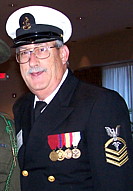 |
Chief Hospital Corpsman James P. Donovan, United States
Navy Retired, is a common hero of the American
Heartland. Born and raised in the verdant Kentucky
hills, he served his country for 24 years.
Although he has lived in central Illinois farm country
for decades, when he gets perturbed his pure high pitched
marked bluegrass twang comes through loud and
clear. Its a beautiful sound like a country violin
at a square dance.
His family background is pure Americana. His
father, son of Irish immigrants, served in the US Army in
WWI, and his eldest brother served in World War II; his dad
was a Corporal in the US Army, and served in
France. His brother served aboard minesweepers in
the US Navy as a Machinists Mate Second Class (E5),
acting Chief. Another brother served in the Korean
War, also in the Navy, as a Seaman Boatswain's
Mate. Like so many other young men, upon
graduating from high school, it was the most natural
thing for him to follow his brothers into the
Navy. According to Jim, the "romance of the
Navy" was something he'd dreamed about throughout
his youth. "I used to wear my brother's old dress
blue jumper sometimes, little realizing that I would
eventually have it re-piped and wear it for real on
active duty!" Perhaps one has to have been a
sailor, as we have, to understand the allure and
satisfaction of putting on that special uniform and
being a member of the United States Navy on a steel gray
vessel at sea.
|
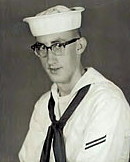
|
Being gay
had nothing to do with it. He hardly knew what the
word meant, nor understood who he was at that point in
his young life in the early 1960s. It was not
until he was in the Navy and stationed at the Navy's
largest and oldest of hospitals in Portsmouth VA that he
met others like himself that it all became clear and a
complete life could be realized. That was the most
common experience of patriotic volunteer Vietnam Era
vets who discovered themselves while in the service of
their country. |
As
a Corpsman, he experienced an environment in
which there was a quiet acceptance of those many
servicemembers in that rating with an
alternative lifestyle. "One did one's
job and no one cared what youdid on your own
time," he said. Nevertheless, in those days, in the 60s,
there was what was know as 'the Spring Roundup' to root
out 'undesirable' homosexuals. Hence, it was
necessary to watch one's associations, and be on guard
at all times to avoid being discovered and dishonorably
discharged simply for being who you were. How
unfortunate and unnecessary all that was (and still is),
particularly in a military medical environment
where, even then, colleagues were cognizant of the
irrelevance of a corpsman's orientation. Today,
under the Don't Ask Don't Tell policy, the constant
scrutiny and suspicion generated by the policy creates a
far more intense stress for those serving in silence
than ever before. In
addition to those 700 - 900 individuals discharged
yearly simply due to being homosexual, an additional
2000 - 3000 (nearly a brigade) simply do not reenlist
because of the policy's pressure.
After his first five-year tour, Petty Officer Third
Class Donovan left the Navy, taking with him his
technical training and experience, and began a hospital
work career. Yet, although he was doing the same
sort of rewarding work, he ultimately missed the
camaraderie, Navy life, and sense of service to his
country. He returned to continue his military
career to conclusion in the Naval Reserve, including
field service with the US Marine Corps.
| Among his many duties over
the years, he served in emergency rooms, a newborn
nursery, a castroom, and as an operating room
technician. But one of his chosen
"duties", though not official, was his efforts
to help and advise other gay sailors who seemed to be
having difficulty. "I couldn't watch some guy
screw up his career just because he was gay."
One duty station had a distinct advantage: "My
commanding officer was gay, and I can't begin to guess
how many guys he kept out of trouble. I was proud
to be on his "team."
|
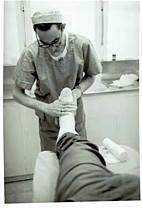
|
|
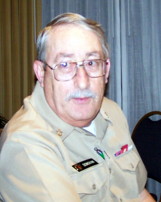
|
Chief's duty stations included Rota, Spain; Kenitra,
Morocco; Yokohama, Japan; Memphis, TN; Portsmouth &
Norfolk, VA; Camp Pendleton, CA; and aboard the destroyer
USS Strong, and the fast frigate USS Lang. His service
was recognized with a Naval Reserve Meritorious Medal
and a Navy Reserve Service Medal, among others.
As he rose through the ranks to Chief, over the course
of his twenty-four years in the Navy, Hospitalman
Donovan took increasing pride and pleasure both in
setting an example for others to follow, as well as in
being able to be a mentor and counselor to those peers
and subordinates needing advice.
|
Following his retirement from the Navy in the early
1990s, Chief Jim was among the early members of Gay Lesbian & Bisexual Veterans of America (GLBVA) which
later became American Veterans For Equal Rights (AVER),
dedicated to the repeal of DADT and serving the needs of
lesbian gay bisexual and transgender veterans.
From its inception, the Don't Ask Don't Tell law was
recognized as institutionalized homophobia, which would
make honest honorable service far more difficult, if not
impossible, for patriotic volunteers who happened to be
gay.
Chief Jim has served in several positions on the GLBVA/AVER
board of directors --viz., Secretary, Vice-president and
two non-successive terms as president, leading the
nation's only national LGBT veterans' association as it
grew to include more and more chapters in cities across
the country. This year, at AVER's National
Convention in Cleveland, he was selected to again lead
America's LGBT vets into the culmination of efforts to
enable all courageous volunteers to serve their nation
in pride, openly as they are.
|
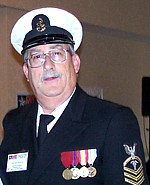
|
"One
of my proudest moments connected with my
military service was when as president of AVER,
I received an invitation from the Dept. Of The
Army inviting me to place a wreath at the tomb
of the Unknowns in Arlington National Cemetery
as part of the National Memorial Day Ceremony.
The fact that this invitation came from the Army
shows that we command a certain respect from the
Military as well as the Dept. of Veterans
Affairs. And as I stood there before this noble
shrine, this military Holy of Holies, I
reflected on the thousands of unknown GLBT
servicemembers who, serving in silence,
dedicated their lives to this country and all it
stands for. And I humbly dedicated my
presence to all of them." |
"Every Veterans' Organization was founded with a
specific purpose in mind: the American Legion for
Health care for Spanish-American War Vets, the VFW
for job assistance for WWI Vets, and AMVETS for
camaraderie of "like-minded" vets.
GLBVA/AVER was organized for the twofold purpose of the
abrogation of DADT, and to be an inclusive organization
for all veterans who support GLBT issues and concerns.
Even after the removal of the ban, there will be a
need more than ever for AVER. Our organization
continues to grow, and chapters are gearing up to find
more ways of supporting GLBT vets who may suddenly come
out!"
|